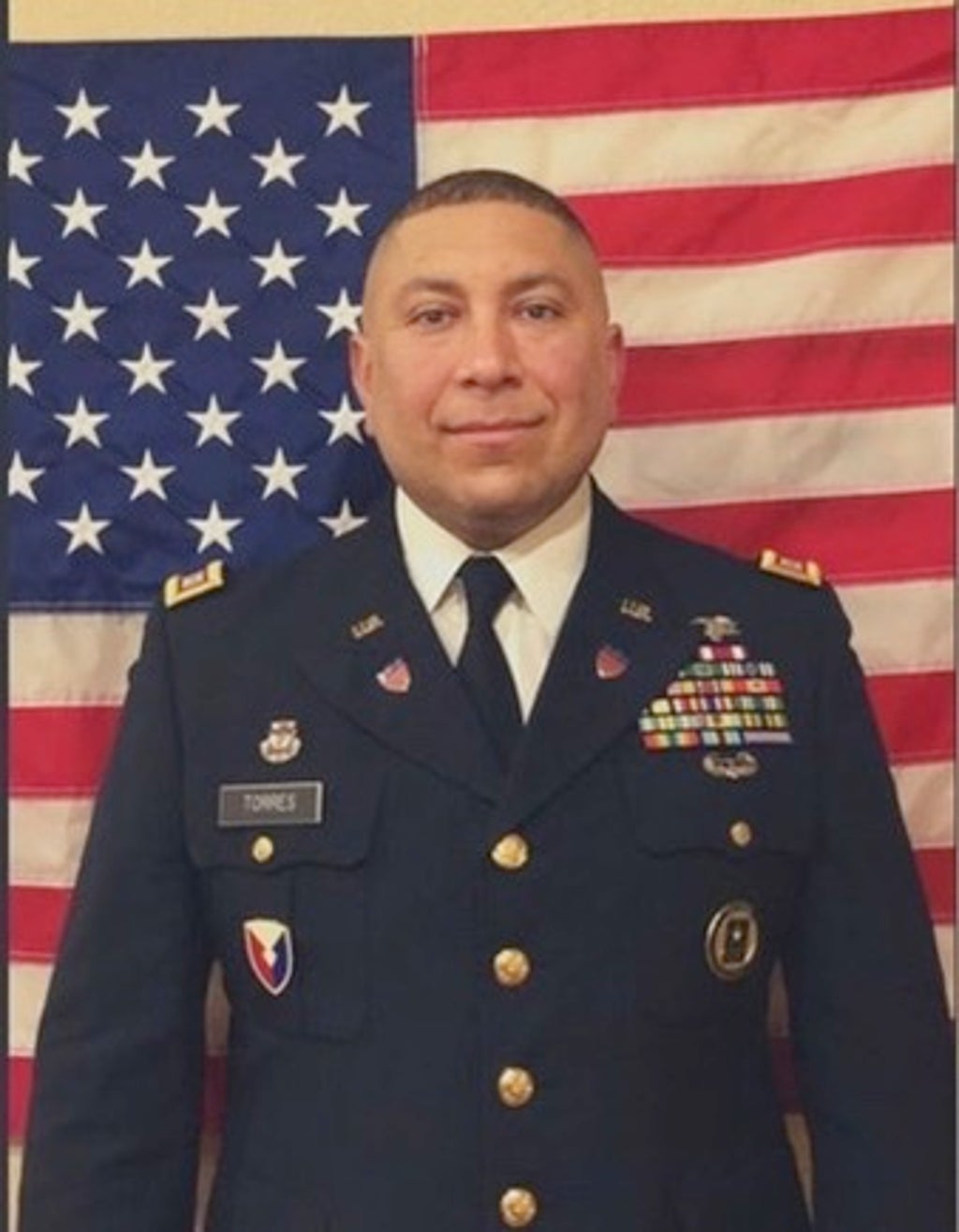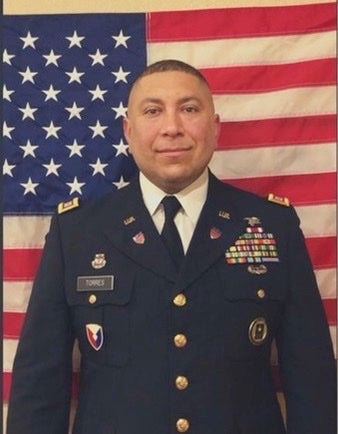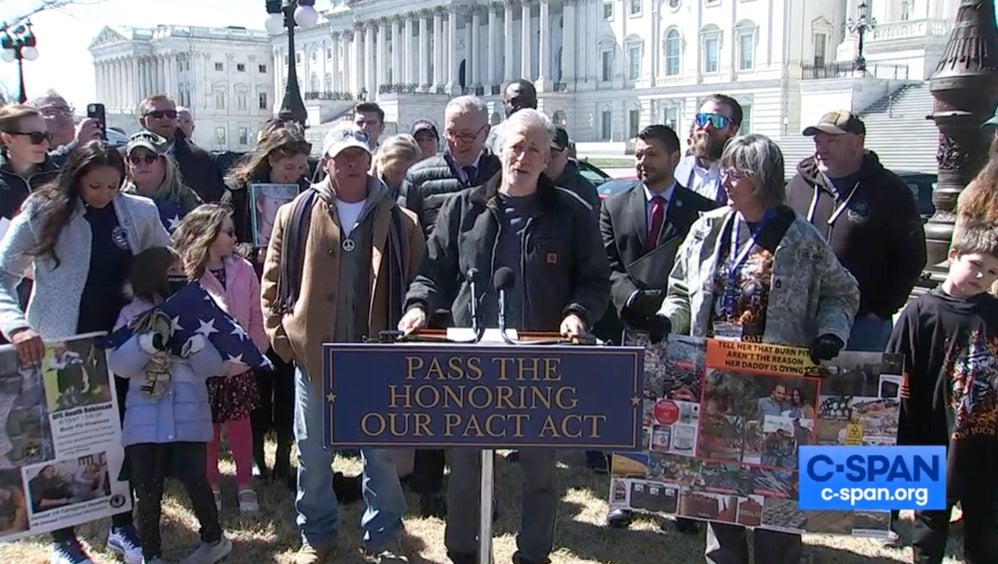
The US Supreme Court has heard the case of a 23-year veteran who says he was forced out of his job as a Texas state trooper after returning sick from the Iraq war because of toxic exposure to burn pits.
Le Roy Torres, a US Army veteran and former Texas state trooper, sued the Texas Department of Public Safety (TDPS) for employment discrimination based on his military service.
The state of Texas has argued that it cannot be sued by Mr Torres because of sovereign immunity.
After more than five years of legal wrangling through the state courts, America’s highest court heard the case on Tuesday.
The Supreme Court is now poised to make a decision around whether it is the state or the federal government that has the ultimate power to decide whether Mr Torres can or cannot sue Texas - in a ruling that could impact thousands of other veterans in the state.
Mr Torres’ attorney Andrew Tutt told the Supreme Court that Mr Torres “brought a piece of the war” home with him when he developed a terminal lung condition, and then he lost his job with the TDPS.
“Captain Torres went to war and when he came home he brought a piece of the war with him and if he had been a member of the local sheriff’s department or a US Marshal or worked for any other employer he would have been able to sue to vindicate his rights,” said Mr Tutt.
“But because he worked for Texas he had no cause of action.”
Mr Torres was working as a state trooper for TDPS and was an Army reservist when he was deployed to Iraq in 2007.
He was stationed in Balad where he breathed in toxic fumes from vast burn pits that were used to dispose of military waste on the bases.
He began suffering respiratory issues while on deployment and was hospitalised within a matter of weeks of returning home to the US at the end of his tour.
Mr Torres’ wife Rosie Torres previously told The Independent how her husband returned from deployment and his health deteriorated rapidly.
“He sounded like he was coughing up a lung,” she said, adding that, at one point, he collapsed at home in front of their three children.
They made countless trips to the hospital but doctors could not determine what was wrong with him.

Mr Torres was medically discharged from the Army and, in 2010, he was diagnosed with constrictive bronchiolitis - a rare form of lung cancer caused by toxic exposure - and later toxic brain injury.
Following his diagnosis, he asked the TDPS to reassign him to a different role due to his condition.
He claims his employer refused to provide any accommodation for him, saying he must return to his original role as a trooper.
Unable to perform his duties due to his serious and escalating health issues, Mr Torres says he was forced to resign.
Mr Torres first sued the TDPS and the state of Texas for discrimination in 2017 under the Uniformed Services Employment and Reemployment Rights Act (USERRA), which makes it illegal for employers to discriminate against employees over military service.
Under USERRA, employers are required to put individuals back to work in their civilian jobs after military service.
But the suit has stalled for the last five years in state court.
The state of Texas claimed that individual states have sovereign immunity from lawsuits like the one brought by Mr Torres.
In state court, the immunity motion was denied but was then upheld on appeal, meaning the Texas Supreme Court refused to hear Mr Torres’ case.
In December, the US Supreme Court finally agreed to hear his case to decide whether members of the military can bring private lawsuits against states for employment discrimination based on their military service.
Mr Torres’ attorney told the Supreme Court justices that, under federal War Powers, Congress has the power to recruit military members like Mr Torres who was called up from the reserves.
“Rather than create a massive peacetime standing army, the United States instead created a reserve component to train soldiers who would keep their civilian jobs, but would be ready to respond at a moment’s notice to unpredictable global threats,” said Mr Tutt.
Promising soldiers that they will not be discriminated against when they return is part of this ability to raise an army, he said - meaning that the state can be sued by veterans when this is not followed.
“To convince soldiers to join that force, and to ensure that soldiers in it would be willing to risk significant injury without hesitation, Congress promised these soldiers that they would not be discriminated against on the basis of their military service, or service-connected injuries.
“USERRA and the cause of action that makes its rights real is not a tangential or peripheral exercise of the war powers but a core exercise of the United States’ power to raise and support its Army to fulfill its indispensable first task, protecting the national security.”

Judd Stone, an attorney for the state, argued that, under sovereign immunity, Texas has the power to decide if it can be sued.
“Sovereign immunity never limits the ends that Congress may pursue, only the means that Congress may use in achieving them,” he said.
“Neither precedent nor history show that the states authorized Congress to use the means of subjecting states to private damages actions by delegating the ends of raising an army to Congress.
“Torres’s contrary argument rests on two premises: first, that the Constitution delegates a plenary and exclusive war power to Congress and, second, that the erection of state sovereign immunity impermissibly frustrates the exercise of those war powers.”
It is not clear when the Supreme Court justices will announce their decision.
The oral arguments in the Supreme Court came the same day that a Senate hearing was held over a burn pits bill that will ensure veterans sick and dying from toxic exposure to burn pits on deployment overseas have access to the healthcare and benefits they need.
The Honoring Our PACT Act, newly renamed the SFC Heath Robinson PACT Act, will presumptively link 23 cancers, respiratory illnesses and other conditions to a veterans’ exposure to burn pits, giving them automatic access to VA healthcare and benefits.
The bill passed the House earlier this month, with all Democrats and 34 Republicans voting in favour of its passage, sending it to the Senate.
Senate Majority Leader Chuck Schumer, TV host Jon Stewart and other lawmakers and veteran advocates gathered for a press conference in DC on Tuesday where they called on lawmakers to send the bill to the president’s desk.
The bill comes after veterans have fought for years to have get access to the healthcare and benefits they need for their illnesses caused by breathing in toxic fumes from burn pits on their deployment to Iraq and Afghanistan.
Thousands of US service members returned home from deployment and developed health conditions including rare cancers and lung conditions caused by the burn pits but their claims were turned down by the VA because the burden of proof was on them to prove a direct link.
Like thousands of other veterans, the VA denied Mr Torres’ claims for service-connected illness due to burn pits exposure for a long time because constrictive bronchiolitis is not a presumptive condition.
Mr and Ms Torres together cofounded Burn Pits 360 to advocate for other veterans also fighting to get access to the healthcare they need.







